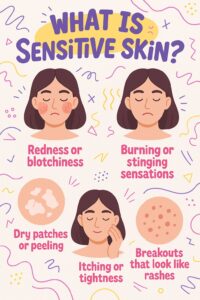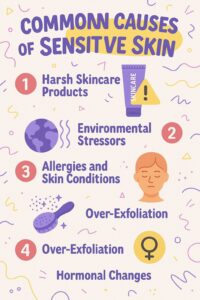Everything You Need to Know About Treating Sensitive Skin
Sensitive skin is more than just a skincare buzzword—it’s a real condition that affects millions of people around the world. If your skin often feels irritated, tight, or red after applying products or being exposed to weather changes, you might be dealing with sensitive skin. Understanding the causes and how to care for sensitive skin properly can make a world of difference in your comfort and confidence.
In this post, we’ll break down what causes skin sensitivity, how to identify it, and the best practices for treating and managing it.
What Is Sensitive Skin?
Sensitive skin isn’t a medical diagnosis on its own, but rather a term used to describe skin that is easily irritated. It reacts more strongly than normal to external factors such as skincare products, climate

changes, pollution, or even stress. You may experience symptoms like:
• Redness or blotchiness
• Burning or stinging sensations
• Dry patches or peeling
• Itching or tightness
• Breakouts that look like rashes
These symptoms can vary from mild to severe and may appear occasionally or persistently.
Common Causes of Sensitive Skin
Understanding what triggers your skin is the first step toward effective care. Here are a few common culprits:

1. Harsh Skincare Products
Many over-the-counter products contain alcohols, fragrances, or strong acids that can strip the skin barrier and cause irritation.
2. Environmental Stressors
Cold winds, extreme heat, sun exposure, and pollution can aggravate already sensitive skin.
3. Allergies and Skin Conditions
Conditions like eczema, rosacea, and contact dermatitis often go hand-in-hand with sensitivity.
4. Over-Exfoliation
Using scrubs or acids too often can damage your skin’s protective barrier, leading to increased sensitivity.
5. Hormonal Changes
Hormonal imbalances during menstruation, pregnancy, or menopause can affect the skin’s sensitivity levels.
How to Treat Sensitive Skin: Best Practices

1. Simplify Your Routine
Sensitive skin responds best to a minimalist routine. Stick to basic, gentle products:
• A mild, fragrance-free cleanser
• A lightweight moisturizer
• Broad-spectrum sunscreen with SPF 30 or higher
Avoid using too many active ingredients at once.
2. Patch Test New Products
Always patch test new products before applying them to your face. Apply a small amount to your inner arm or behind your ear and wait 24–48 hours to check for reactions.
3. Hydrate, Hydrate, Hydrate
Hydration is key to calming sensitive skin. Look for moisturizers with soothing ingredients like:
• Hyaluronic acid
• Ceramides
• Aloe vera
• Colloidal oatmeal
• Centella Asiatica (Cica)
These ingredients strengthen the skin barrier and reduce inflammation.
4. Protect Your Skin Barrier
Avoid foaming cleansers, alcohol-based toners, and rough exfoliants. Instead, use cream-based or oil-based cleansers and exfoliate only once a week using gentle acids like lactic acid.
5. Use Sunscreen Daily
UV damage can make sensitive skin worse. Choose mineral sunscreens with zinc oxide or titanium dioxide, which are less likely to irritate.
6. Be Mindful of Climate Control
Dry indoor heating or strong air conditioning can strip moisture from your skin. Use a humidifier indoors to maintain moisture levels in the air.
What Ingredients to Avoid
Certain ingredients are more likely to trigger sensitive skin. Try to avoid or minimize exposure to:

• Artificial fragrances and dyes
• Alcohol (especially denatured alcohol)
• Essential oils (can be irritating in high concentrations)
• Sulfates (common in foaming cleansers)
• Retinoids and strong acids (unless recommended by a dermatologist)
When to See a Dermatologist

If your skin reacts to everything or shows persistent redness, flakiness, or swelling, it’s best to consult a dermatologist. You may have an underlying skin condition like rosacea or eczema that requires prescription treatment.
Final Thoughts
Treating sensitive skin is all about listening to your skin and choosing products and routines that support—not challenge—it. With gentle care, the right ingredients, and a consistent routine, you can calm your skin, reduce irritation, and regain a healthy glow.
Your skin may be sensitive, but that doesn’t mean it can’t be strong, balanced, and beautiful.
